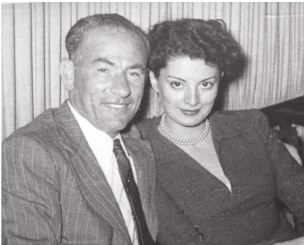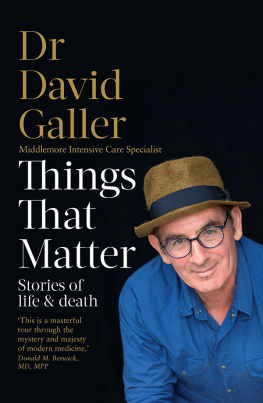
David Galler is the son of Anton Galler and Zosia Minc, Polish Jewish immigrants to New Zealand in the late 1940s and early 1950s, both now deceased. He lives in Auckland with his partner with whom he has two adult children.
For the past 25 years David has worked as an intensive care specialist at Middlemore Hospital. In 2011 he became a clinical director at Ko Awatea and chair of the Programme Committee of the annual APAC Forum. He has recently returned after a year working in Samoa. While there, he established an intensive care service to better identify and effectively manage infants, children and others with acute reversible disease and worked with the National Health Service and the National University of Samoa to establish in-country training for postgraduate medical education.
David was schooled at Wellington College. He gained his first degree from Victoria University in 1975 before becoming a bus driver with the Wellington City Council. In 1977 he was accepted to Otago University School of Medicine, graduating in 1981. Subsequently he went on to train in anaesthesia and then intensive care in London and New Zealand.
During his career, he has held a number of leadership positions, including Clinical Director of Acute Care Services Middlemore Hospital, Vice-president and President of the Association of Salaried Medical Specialists, Principal Medical Advisor to Ministers of Health and Director Generals of Health and was a foundation board member of the New Zealand Health Quality Safety Commission.
First published in 2016
Copyright David Galler 2016
All rights reserved. No part of this book may be reproduced or transmitted in any form or by any means, electronic or mechanical, including photocopying, recording or by any information storage and retrieval system, without prior permission in writing from the publisher.
Allen & Unwin
Level 3, 228 Queen Street
Auckland 1010, New Zealand
Phone: (64 9) 377 3800
Email:
Web: www.allenandunwin.co.nz
83 Alexander Street
Crows Nest NSW 2065, Australia
Phone: (61 2) 8425 0100
A catalogue record for this book is available
from the National Library of New Zealand
ISBN 9781877505645
eISBN 9781952533693
Internal design by Kate Barraclough
Internal illustrations by Jo Pearson
Typeset by Post Pre-press Group, Australia
Cover photograph: Babiche Martens
Cover design: Kate Barraclough
Contents

To the memory of
Aron Galler
8 October 19122 May 1990
and
Zosia Galler
3 May 19298 June 2012

MY FATHER ARON GALLER died at 6 a.m. on 2 May 1990, the day before my mothers birthday. He was 77 years old. As he lay dying on the floor, his head in my mothers arms, he looked startled and asked, Whats happening, Zosia? Then he was gone.
Helpless, distraught and furious, my mother tried to bring him back to life by screaming and punching him. Needless to say it didnt work. His heart, the dumbest organ in the body, had stopped forever.
My mother called our GP, who came immediately. Too late to help Dad, she rang me as I was waking up to go to work at Middlemore Hospital in South Auckland.
I will never forget that phone call because of the guilt that welled up in me as soon as the phone rang. It was as though I already knew what had happened. You see Dads death was not a surprise to me. Wed been talking on the phone a lot in the past few days and he had described to me what we in the game call crescendo anginaan escalation of chest pain that commonly leads to a heart attack and sometimes cardiac arrest.
My father was a good man. He came to New Zealand from Poland as a refugee in 1947. A lawyer by training he did what we Jews do wellhe went into the schmutter business, in Dads case, womens clothes.
When he first arrived in New Zealand he worked with his older brother Oser manufacturing womens coats, but after a near fatal fight they went their separate ways; Dad to the corner of Adelaide Rd overlooking the Basin Reserve. There he established a small manufacturing company and employed a dozen seamstresses, most of them, like him, refugees from Eastern Europe.
Dad had lived through interesting times, and he was kind and generous to a fault. He loved my mother more than anything and she depended on him for almost everything. Despite all of that his heart decided to stop and with that so too did the flow of blood and oxygen to all parts of him.
No, this was not a surprise. It was a consequence of many years of heart problems, which my brother and I jokingly blamed on my mothers cookingespecially her baked Polish cheesecakeand the second-hand smoke generated by her chain smoking. The cheesecake was a culinary IED; enough to give me angina just knowing it was on the kitchen table. Her other delight, the less poisonous Polish coffee cake, was simply too irresistible to leave alone and in the end must also carry some of the blame for my fathers downfall.
My mother, Zosia Galler, was a socialite and the Polish coffee cake was baked fresh most days to feed the constant run of visitors to our house in the Wellington suburb of Wadestown. Mostly they were Eastern European friends of my parents who loved nothing more than a cigarette, a chat, coffee and cake. What was left over from the previous days cake was eaten by my father. Every morning, elegantly attired in his silk dressing gown and hairnet, he could be found, knife in hand, dissecting out and eating the cakes rich veins of chocolate before demolishing the cake itself.
Dads eldest brother, Oser, was married to Aunt Nina. She was also a heavy smokerin her case not the mild Peter Stuyvesant or Rothmans that my mother loved but unfiltered Capstan Plain cigarettes. Oser had similar eating habits to those of my father. He loved picking from dishes in the fridge or on the stove but his penchant was for the savoury. He too died from heart disease. Maybe that will be my fate as well, but on average my family history suggests Zyklon B, the gas used by the Germans in the Second World War to exterminate so many Jews, as the most likely cause of my demise.
In my first year at med school in Dunedin, groups of us were assigned a cadaver. They were laid out on two rows of stainless steel tables that ran the length of a large, whitewashed, highceilinged room. Along both sides of the room were floor-to-ceiling windows, between them hung painted scrolls illustrating various parts of the human anatomythe arterial system of the body with its blood full of oxygen, vessels coloured red; the veins of the body, its blood depleted of oxygen by the tissues of the body, coloured blue; the brachial plexus, nerves coloured yellow coming from the neck, going to the arm; the Circle of Willis, the beautifully designed arterial system at the base of the brain coloured red, and much more. In one such space was a floor-to-ceiling painting of the heart along with various drawings illustrating its chambers and valves, and one even showing the wiring system that accounted for the metronomic reliability that is its hallmark.
Nowhere was there a painting to illustrate what is commonly attributed to the heart: love, tenderness, and the range of emotions we all associate with it. Nowhere in the dissection of that organ did we see any hint of them either. It was an exercise that many in my group, still young and idealistic, found disappointing and sobering. Our heart was brown and rubbery, and smelled of formalin. Standing there in the dissection room, it was just another dead organ from the dead body in front of us. It was hard to believe that it could inspire such whimsy, let alone once have been that complex mix of flesh and blood; a pump, that slavishly served the brighter parts of usour brain, liver and kidneys.
Next page









